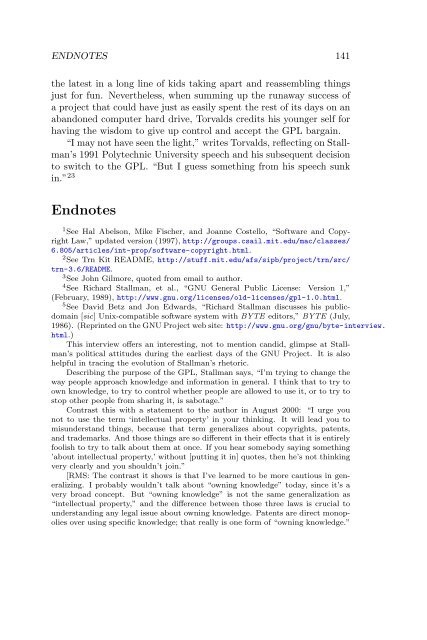You also want an ePaper? Increase the reach of your titles
YUMPU automatically turns print PDFs into web optimized ePapers that Google loves.
ENDNOTES 141<br />
the latest in a long line of kids taking apart and reassembling things<br />
just for fun. Nevertheless, when summing up the runaway success of<br />
a project that could have just as easily spent the rest of its days on an<br />
abandoned computer hard drive, Torvalds credits his younger self for<br />
having the wisdom to give up control and accept the GPL bargain.<br />
“I may not have seen the light,” writes Torvalds, reflecting on Stallman’s<br />
1991 Polytechnic University speech and his subsequent decision<br />
to switch to the GPL. “But I guess something from his speech sunk<br />
in.” 23<br />
Endnotes<br />
1See Hal Abelson, Mike Fischer, and Joanne Costello, “Software and Copyright<br />
Law,” updated version (1997), http://groups.csail.mit.edu/mac/classes/<br />
6.805/articles/int-prop/software-copyright.html.<br />
2See Trn Kit README, http://stuff.mit.edu/afs/sipb/project/trn/src/<br />
trn-3.6/README.<br />
3See John Gilmore, quoted from email to author.<br />
4See Richard Stallman, et al., “GNU General Public License: Version 1,”<br />
(February, 1989), http://www.gnu.org/licenses/old-licenses/gpl-1.0.html.<br />
5See David Betz and Jon Edwards, “Richard Stallman discusses his publicdomain<br />
[sic] Unix-compatible software system with BYTE editors,” BYTE (July,<br />
1986). (Reprinted on the GNU Project web site: http://www.gnu.org/gnu/byte-interview.<br />
html.)<br />
This interview offers an interesting, not to mention candid, glimpse at Stallman’s<br />
political attitudes during the earliest days of the GNU Project. It is also<br />
helpful in tracing the evolution of Stallman’s rhetoric.<br />
Describing the purpose of the GPL, Stallman says, “I’m trying to change the<br />
way people approach knowledge and information in general. I think that to try to<br />
own knowledge, to try to control whether people are allowed to use it, or to try to<br />
stop other people from sharing it, is sabotage.”<br />
Contrast this with a statement to the author in August 2000: “I urge you<br />
not to use the term ‘intellectual property’ in your thinking. It will lead you to<br />
misunderstand things, because that term generalizes about copyrights, patents,<br />
and trademarks. And those things are so different in their effects that it is entirely<br />
foolish to try to talk about them at once. If you hear somebody saying something<br />
’about intellectual property,’ without [putting it in] quotes, then he’s not thinking<br />
very clearly and you shouldn’t join.”<br />
[RMS: The contrast it shows is that I’ve learned to be more cautious in generalizing.<br />
I probably wouldn’t talk about “owning knowledge” today, since it’s a<br />
very broad concept. But “owning knowledge” is not the same generalization as<br />
“intellectual property,” and the difference between those three laws is crucial to<br />
understanding any legal issue about owning knowledge. Patents are direct monopolies<br />
over using specific knowledge; that really is one form of “owning knowledge.”


